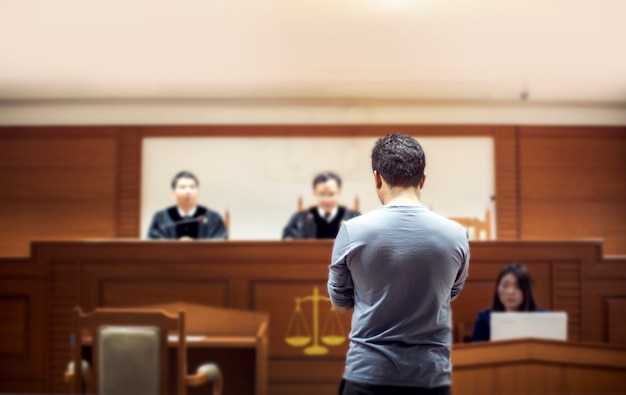Criminal Defense
What does a criminal trial look like in Japan?
Criminal trials in Japan

For a very basic summary, criminal trials in Japan are conducted in the following sequence: opening procedures, examination of evidence, and judgment. If the accused party is not satisfied with the judgment of the district court the first time, they can appeal to the high court.
Opening procedures
Opening procedures are the procedures from the start of criminal trial procedures to the start of examination of evidence. The opening procedures include questioning the identity of the accused, reading of the charge sheet, reading of the defendant’s rights such as the right to remain silent, and arraignment of the charged facts.
Initial procedures are carried out on the first trial date, and questions on the identity of the accused are first asked. In questioning on the identity of the accused, the defendant’s address, name, date of birth and legal domicile are asked in order to confirm that the defendant is is indeed who they say they are.
After the identification questions, the charge sheet is read aloud. In the reading of the charge sheet, the prosecutor reads the charge sheet and reveals what facts he is trying to prove, including the name of the crime. After the reading of the charge sheet, the presiding judge will tell you your rights, such as the right to remain silent, and what you should be careful about in a trial.
After these proceedings have been completed, the accused and their lawyer will have an opportunity to plead their case and whether or not they will plead guilty to the charges set out in the charge sheet. If you admit your guilt here, it is almost impossible to overturn it later. It is important to have a thorough discussion with your lawyer before the opening trial date starts.
Examination of evidence

The examination of evidence is a procedure in which the public prosecutor and the defense counsel present each piece of evidence to the judge. Before this examination of evidence, the judge has to have a blank slate with no evidence to eliminate any possibility of bias.
First, the opening statement is first made. The opening statement goes into considerable detail about what charges prosecutors are trying to establish. Because the charge sheet contains only the core facts that constitute the crime, the specific facts to be proved in the trial have not yet been clarified. In the opening statement, it is also possible to explain the circumstances in favor of the defendant that the lawyer plans to prove.
After the opening statement, the public prosecutor and the lawyer explain to the judge the schedule for the activities of proof and request examination of evidence. The judge also receives a request for examination of evidence and decides whether the evidence needs to be examined.
When a judge decides that evidence needs to be examined, it is examined by the public prosecutor and the defense counsel. For example, if the evidence is testimony by a witness, the public prosecutor and the defense counsel ask the witness questions and have the witness testify. If the evidence is in writing, the public prosecutor or counsel will read it aloud and convey the contents to the judge. Also, if the evidence is something like a knife, the judge will look at it directly.
Judgment
After the examination of evidence, the public prosecutor compiles the history of the case and submits a final opinion. Various facts become clear after the examination of evidence. Based on these facts, the public prosecutor in charge of the trial makes a judgment.
Then comes the final argument. The final argument is the accused’s lawyer’s final counterargument against the prosecutor’s argument and request for a sentence. They argue that the defendant is innocent (partial acquittal) and that the defendant has circumstances that must be considered.
The rendition of judgment is the conclusion of a criminal trial. Decisions are delivered in an open court, open to the public. The presiding judge reads aloud the main text that leads to the conclusion of innocence (partial acquittal) and guilt, and explains in detail why they came to such a conclusion.
When delivering a death sentence, in order to ease the agitation of the accused and the audience, they often state the reason for the sentence and end the judgment with the words “death sentence”.
If you are not satisfied with the initial judgment, you have two weeks to appeal to a higher court. If you appeal, you can be heard again.
This page is intended to be used for informational purposes only and should not be a substitute for obtaining professional legal advice.